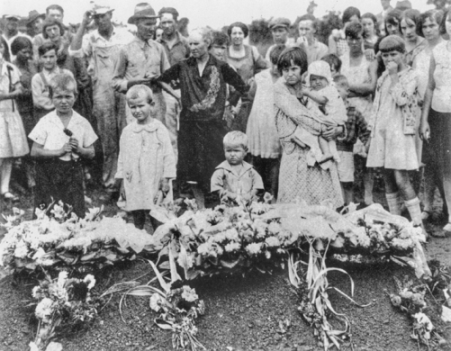1896–15 Nov. 1954

Fred Erwin Beal, union organizer for the National Textile Workers' Union and leader of the Gastonia strikes of 1929, introduced Communism to North Carolina. He was born in Lawrence, Mass., a textile town to which his parents moved when their farm could no longer support them. There young Beal went to work in a mill at age fourteen, changing bobbins on spinning machines. Very early he became susceptible to radical ideas. At a time when the labor movement was beginning to blossom, Beal quickly joined those calling for better working conditions, shorter hours, and higher wages; when eighteen years old he participated in a strike over a wage cut in the Pacific Mills in Lawrence. He continued strike activities, changing jobs several times, and came to associate with Socialist party union members. Soon it appeared to him that the American Communist party was more active than any other on the workers' behalf; and in 1928 a strike in New Bedford, Mass., which brought out some thirty thousand workers, brought Beal into the party. His work in New Bedford earned him a reputation as a good organizer.
The following year, Beal went south to Charlotte, where he represented the Communist-run National Textile Workers' Union. An extremely skilled organizer, he was able to overcome the distrust many workers felt toward the northerner. Taking advantage of the extremely harsh working conditions and playing down his Communist association, Beal soon organized a local in Gastonia. This was one of the earliest unions at a textile mill in North Carolina and was the first Communist-backed one. Soon a cause developed around which the union was able to take root. At the Loray mills, where the small secret local was organized, five employees were discovered to be party members and were discharged. Beal was able to rally two hundred mill workers to strike against this action. Through hard work, he spread the activity to other mills in the area. Five companies of North Carolina National Guard were called out to control the disorder.
Finally, in an atmosphere of mounting pressure, shooting broke out between strikers and Gastonia police, and Chief O. F. Aderholdt was killed. With anti-Communist sentiment growing, Beal and six others were found guilty, in an emotion-charged courtroom, of conspiracy to murder. As strike leader, Beal received a sentence of sixteen to twenty years. While on bail he slipped out of the country to visit the Soviet Union. With dreams of "the workers' fatherland" in his mind, he was eager to see the grand Communist experiment before he began serving his sentence. Although Beal was disappointed in what he saw, after he came home he decided to give the Soviet Union another chance. Skipping bail, he went back for three years, working in several capacities, but became convinced that Soviet workers were worse off than their American counterparts. Not only were conditions bad, but he also missed freedoms he had known in the United States.
Back in the United States again, Beal wrote Proletarian Journey to expose the actual conditions of workers in the Soviet Union. Then, in 1938, he turned himself over to North Carolina authorities and began serving his sentence. After almost four years he was paroled because of both good behavior and popular sentiment that his trial had not been a fair one. Governor Melville Broughton authorized the parole on 9 Jan. 1942. Six years later, on 20 May 1948, Beal's American citizenship was restored, as he totally renounced Communism. He worked for a textile company in New York for a while, quietly pursuing union activities and lecturing in opposition to Communism. He died of a heart attack in Lawrence, Mass.